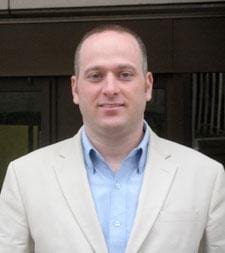Kyle Freeman is cold, callous, and selfish — at least, that’s how he’s been portrayed by much of the mainstream media and the lawyers for Canadian Blood Services.
But interviews with Kyle’s family, friends and coworkers paint a different portrait: Freeman, 36, is boyishly charming, naive and cracks jokes when he’s nervous. He holds doors open for people. He lost over 40 pounds this year while on a health kick. He dresses up as Mrs Doubtfire every year for Halloween.
Kyle is currently challenging a Canadian Blood Services blood donation policy he doesn’t agree with — a policy banning gay men from giving blood.
During the Freeman vs Canadian Blood Services (CBS) court proceedings, Kyle posed for rushed photographers, walking in and out of the courthouse like an actor does for the glory of filmmaking. He did this for the same people who painted him with headlines that (incorrectly) proclaimed that he was using blood donation as a way to test himself for HIV.
In the end, Kyle’s only regret for being too candid in a lion’s den of hungry reporters was not being dressed in a suit when his photo was taken.
“I looked like a criminal,” says Freeman of an Ottawa Citizen photo of him leaving the Ottawa courthouse.
“I don’t think I’m a hero or pioneer. It’s about believing in what’s right. Lawyers can argue the hell out of it. At the end of the day, there are people who need blood and there are healthy donors. There’s no rational basis, medical or scientific, to exclude gay men from giving blood,” says Kyle.
Kyle is being sued for donating blood 18 times between 1990 and 1999, but the lawsuit focusses on four specific donations he made between 1998 and 2002.
Since CBS served him in 2002, he’s garnered emotional support from his family, partner, friends and coworkers. He’s also got the support of his father, Robert Freiman, who was also a long-time blood donor.
“I think [Kyle] is fighting for something right. [CBS and Health Canada] shouldn’t discriminate against gay men,” says Freiman. “He’s a fighter. He’s been that way since he was a child.”
Freiman isn’t the only one who’s supporting Kyle’s fight. Those around him — including friends who date back to university — are cheering him on from the sidelines. Didier Pomerleau has known Kyle for nearly 20 years.
“It’s about time somebody does something,” says Pomerleau of the blood ban. “It’s a bit like being friends with Rosa Parks in the 1950s.”
“Kyle has 100 per cent of my support,” says another friend, Alex Kogan. “He’s doing us a favour. He’s got a lot of courage. If someone has the tenacity to do it, it’s Kyle.”
But the making of this activist didn’t happen overnight.
Kyle was born Ayal Freiman, a middle child of middle-class parents on Nov. 28, 1972 in Israel. At age 13, his family immigrated to Canada to avoid Israel’s mandatory army draft. His parents didn’t want him and his brother killed. Then, before he finished high school at Newtonbrooke Secondary School in North York, he joined the Military Police reserves because, he says, he believes in public service.
He dated girls and secretly played around with boys. In the army, it was made quite clear that gays were unwelcome. If found out, gays would fall victim to blanket parties — being tied inside a blanket and beaten.
“Of course I was afraid of being beaten. What worried me most was not being one of the guys. I was afraid of not being accepted, not being passed off as ‘normal,’” says Kyle.
Slowly coming out in his late teens, Kyle travelled an hour on a subway nearly every day after school to go to the 519 Church Street Community Centre in Toronto — a popular gathering place for queer youth.
“[519] was a good place to meet people for friends, dating. . . in a welcoming and non-alcoholic environment,” says Kyle.
Spending time at the 519 helped Kyle to come out to his family.
“I was very close to my parents. I couldn’t be straight. I felt like I was hiding a big part of me. I was socialized not to talk about the details of my sex life,” says Kyle.
Nowadays, Kyle is married to Vince Freeman, who he lives with in Thornhill, and he manages his own pet care company.
“I’m very proud of him,” says Vince Freeman. “He’s always out to do good. He’s following through on fighting for gay people to have the right to give blood.”
But this fall, it’s a waiting game. Freeman’s case has adjourned for now, and he’s optimistic about the results, which will be released sometime after the trial ends in Jan 2010.
“I think Health Canada and CBS are afraid to take a leap. Neither of them wants to make the decision to change the current questionnaire. I trust this case will be based on fact. People might appeal it, but I think the government and CBS want to do the right thing,” says Kyle.

 Why you can trust Xtra
Why you can trust Xtra


